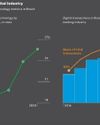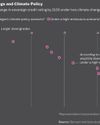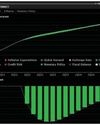Versuchen GOLD - Frei
Climate Risks Come for Sovereign Credit
Bloomberg Markets
|October - November 2021
FOR YEARS climate scientists have warned about the ferocious wildfires and hurricanes that are now overwhelming many communities. Today alarms are ringing about a related financial danger: risks lurking within government bonds, the biggest part of the global debt market.

A growing number of investors, academics, policymakers, and regulators are questioning whether credit ratings—the ubiquitous scores that underpin much of the financial system—are accounting for the impact that extreme weather events and policy changes related to global warming will have on borrowers. Once those risks materialize, they threaten to trigger the kind of sudden, chaotic asset collapse described by the late economist Hyman Minsky. The effects would sweep through pension funds and the balance sheets of central and commercial banks.
“A lot of this looks like it’s years and decades ahead, but when you look at the financial implications, you run into risks of Minskytype moments and rapid devaluations,” says Steven Feit, an attorney at the Center for International Environmental Law in Washington who focuses on climate liability and finance. “The climate time scale is decades or a century long. The financial timeline is right now.”
The Big Three credit rating companies—Moody’s Investors Service, S&P Global Ratings, and Fitch Ratings—all say they take climate-related factors into account when assessing government borrowers and defend their methodology as robust. But investors remember the 2008 credit crisis, when structured products with AAA ratings suffered significant losses. Now studies are highlighting potential long-term risks to government debt that aren’t showing up in today’s ratings.
For instance, 10 of the 26 members of the FTSE World Government Bond Index, including Japan, Mexico, South Africa, and Spain, will default on their sovereign debt by 2050 if there’s a “disorderly transition”—that is, if governments’ attempts to reduce carbon emissions are late, abrupt, and economically damaging. That’s according to research by FTSE Russell, an index provider owned by London Stock Exchange Group Plc.
Diese Geschichte stammt aus der October - November 2021-Ausgabe von Bloomberg Markets.
Abonnieren Sie Magzter GOLD, um auf Tausende kuratierter Premium-Geschichten und über 9.000 Zeitschriften und Zeitungen zuzugreifen.
Sie sind bereits Abonnent? Anmelden
WEITERE GESCHICHTEN VON Bloomberg Markets

Bloomberg Markets
See Which Countries Are Falling Behind On Climate Change
Under the Paris Agreement, 190 countries and the European Union pledged to take steps to hold the global temperature rise to less than 2C (3.6F) from preindustrial levels—and preferably 1.5C.
4 mins
October - November 2021

Bloomberg Markets
Billionaires Vie for the Future of Brazilian Finance
An escalating battle between two billionaires is upending the financial community in São Paulo, Latin America’s wealthiest city.
8 mins
October - November 2021

Bloomberg Markets
Ford Foundation's Darren Walker: ‘We Have to Get Uncomfortable'
DARREN WALKER, 62, disrupted his Wall Street life more than 25 years ago when he left what is now UBS Group AG to volunteer at a school and eventually pursue a career in community development and philanthropy. Since 2013 he’s been at the pinnacle of the philanthropic world as president of the Ford Foundation, created by the family of automaker Henry Ford during the Great Depression to advance human welfare.
8 mins
October - November 2021

Bloomberg Markets
Fueling the Ener Transition
I MAY BE BIASED, but some of the most important research and data on the Bloomberg terminal lies in one of its lesser-known functions: {BNEF }
1 mins
October - November 2021

Bloomberg Markets
Dig Into Analysts' Estimates for Disruptive Companies
THE PANDEMIC ERA generated a whole wave of disruptive companies as it accelerated the introduction of new products and services in areas including artificial intelligence, digitization, electronic payments, online meeting platforms, and virtual currencies.
4 mins
October - November 2021

Bloomberg Markets
Climate Risks Come for Sovereign Credit
FOR YEARS climate scientists have warned about the ferocious wildfires and hurricanes that are now overwhelming many communities. Today alarms are ringing about a related financial danger: risks lurking within government bonds, the biggest part of the global debt market.
7 mins
October - November 2021

Bloomberg Markets
Responsible-Investing Pioneer Lydenberg Says ESG Needs An Upgrade
STEVE LYDENBERG’S passion for social change was inspired by anti-Vietnam War demonstrations, consumer boycotts, and the movement to divest from apartheid South Africa. But he didn’t take to the streets. Instead, Lydenberg turned to the world of finance to help catalyze societal change.
8 mins
October - November 2021

Bloomberg Markets
Engine No. 1's Grancio: ‘People Will Appreciate an Economic Argument'
ENGINE NO. 1 sent shock waves across corporate America in May when the fledgling investment firm won a boardroom battle with Exxon Mobil Corp., securing three seats on the oil and gas giant’s board after purchasing only about $40 million of its stock.
6 mins
October - November 2021

Bloomberg Markets
Find Out Which Companies May Ramp Up Payouts After Covid
AS THE PANDEMIC DISRUPTED business last year, many companies cut or suspended dividends. Which will boost their payouts when economies pick up again?
2 mins
October - November 2021

Bloomberg Markets
Get Into the Minds of Central Bankers as They Navigate Shocks
HAVE YOU EVER WONDERED how central bankers forecast the impact of shocks on the economy?
4 mins
October - November 2021
Translate
Change font size

